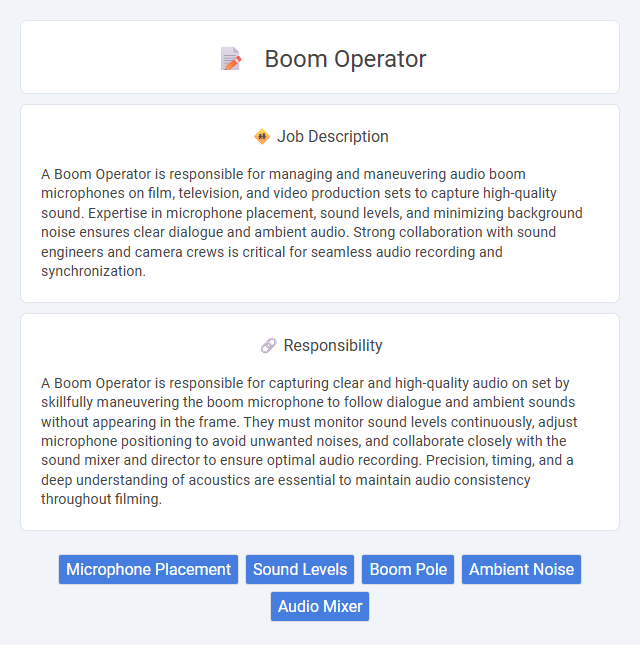
A Boom Operator is responsible for managing and maneuvering audio boom microphones on film, television, and video production sets to capture high-quality sound. Expertise in microphone placement, sound levels, and minimizing background noise ensures clear dialogue and ambient audio. Strong collaboration with sound engineers and camera crews is critical for seamless audio recording and synchronization.
Boom Operator jobs may suit individuals who are physically fit and have good hand-eye coordination, as the role often requires precise handling of audio equipment in dynamic environments. People who can remain calm under pressure and communicate effectively with a production team are likely to perform well in this position. Those with a sensitivity to noise or difficulty maintaining focus might find the job challenging.
Qualification
A Boom Operator must possess a deep understanding of audio equipment, including boom microphones and wireless systems, alongside strong technical skills to ensure clear, high-quality sound capture on set. Proficiency in operating boom poles with precision, knowledge of sound mixing, and the ability to adapt to various filming environments are essential qualifications. Experience in film, television, or theater production, combined with excellent communication and teamwork skills, enhances a Boom Operator's effectiveness in delivering professional audio results.
Responsibility
A Boom Operator is responsible for capturing clear and high-quality audio on set by skillfully maneuvering the boom microphone to follow dialogue and ambient sounds without appearing in the frame. They must monitor sound levels continuously, adjust microphone positioning to avoid unwanted noises, and collaborate closely with the sound mixer and director to ensure optimal audio recording. Precision, timing, and a deep understanding of acoustics are essential to maintain audio consistency throughout filming.
Benefit
Working as a Boom Operator likely offers the benefit of gaining hands-on experience in audio recording and sound engineering, which may enhance career opportunities in film and television production. This role probably provides a chance to develop specialized technical skills, such as operating boom microphones and capturing high-quality sound on set. There is a possibility of working in dynamic environments, contributing to creative projects that could lead to valuable industry networking connections.
Challenge
A Boom Operator may likely face significant challenges in maintaining precise microphone positioning under dynamic and unpredictable filming conditions. The role probably demands exceptional physical endurance and concentration, as operators must continuously adapt to movements while staying out of the camera's frame. Managing ambient noise and capturing high-quality audio in diverse environments could present ongoing obstacles requiring technical skill and creativity.
Career Advancement
A Boom Operator plays a crucial role in film and television production, managing audio capture with precision to ensure high-quality sound. Mastery in microphone techniques and sound equipment can lead to opportunities as a Sound Mixer or Location Sound Supervisor. Continuous skill development, networking, and experience on diverse projects enhance career advancement and open doors to higher-profile productions and leadership roles in audio departments.
Key Terms
Microphone Placement
Boom Operators specialize in precise microphone placement to capture clear and balanced audio on film and television sets. They skillfully maneuver the boom pole to position the microphone close to the actors' dialogue without entering the camera frame, ensuring optimal sound quality. Mastery of directional microphones and noise reduction techniques is essential for minimizing environmental interference during recording.
Sound Levels
Boom operators continuously monitor sound levels to ensure optimal audio quality during film and television production. They skillfully position the boom microphone to capture clear dialogue while minimizing background noise and avoiding distortion from excessively high decibel levels. Maintaining sound levels within industry standards, typically between 60 to 85 decibels, prevents audio clipping and enhances post-production efficiency.
Boom Pole
The Boom Operator skillfully maneuvers the boom pole to capture high-quality audio while maintaining minimal background noise on set. Proficiency in handling various boom pole types, including telescoping and carbon fiber models, ensures precise placement of microphones near the sound source without entering the camera frame. Expertise in boom pole positioning enhances dialogue clarity and overall sound fidelity in film and television productions.
Ambient Noise
A Boom Operator expertly manages microphone placement to capture clear dialogue while minimizing ambient noise interference on set. Precise positioning of the boom pole helps avoid unwanted background sounds such as wind, traffic, or crowd noise, ensuring high audio quality for film and television productions. Mastery in ambient noise control improves post-production efficiency and enhances the overall sound experience for viewers.
Audio Mixer
A Boom Operator specializes in capturing high-quality sound on set by skillfully handling the boom microphone to minimize unwanted noise and ensure clear dialogue recording. Working closely with the Audio Mixer, the Boom Operator feeds precise audio signals that the mixer balances and enhances in real-time for optimal sound output. Expertise in positioning, sound levels, and collaboration is crucial for delivering seamless audio production in film, television, and live events.
 kuljobs.com
kuljobs.com